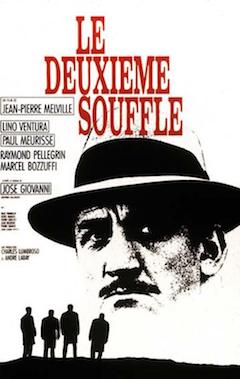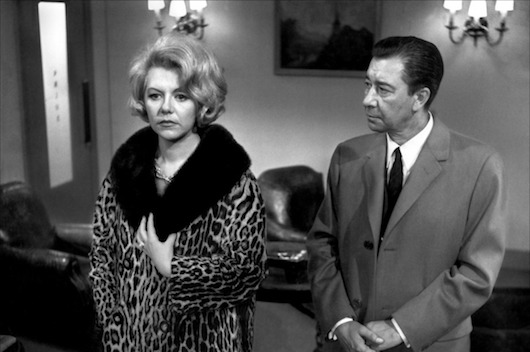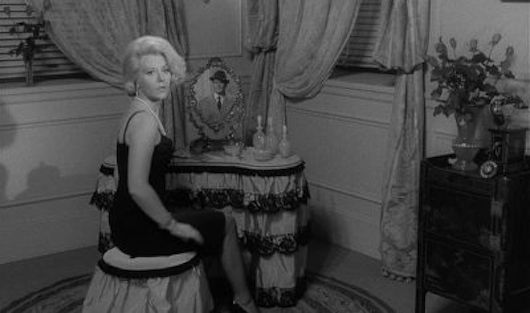 FILM
FILM In Which We Rear Ourselves Against A Great Enemy
 Wednesday, September 6, 2017 at 9:44AM
Wednesday, September 6, 2017 at 9:44AM This is the fifth in a series looking back on the films of the French director Jean-Pierre Melville.

The Man With Qualities
by ALEX CARNEVALE
 I am perfectly aware of the dishonesty it takes to be effective; but the spectator must never be allowed to realize the extent to which everything is manipulated. He must be spellbound, a prisoner; in a state of submission.
I am perfectly aware of the dishonesty it takes to be effective; but the spectator must never be allowed to realize the extent to which everything is manipulated. He must be spellbound, a prisoner; in a state of submission.
In my favorite scene in Army of Shadows, Gerbier (Lino Ventura) is a prisoner of war in occupied France. He is sitting on a bench at gunpoint in a lavish building when he looks down the hall. Opposite him is the most gorgeous clock, looming above him, very high on a far wall; the light down the bright, inviting passageway is incandescent. He cannot take it anymore – he must be free. He turns to the prisoner sitting next to him on the bench, and tells him how it will happen. The last thing anybody remembers is the savage glint off the monster's helmet before chaos erupts.
The first time I saw Army of Shadows, I was convinced I was watching the greatest prison film ever made, shot in an actual concentration camp. When Gerbier breaks out of confinent a half hour into this long motion picture, we realize that is only a part of the project. In 1968, Army of Shadows was adapted by Jean-Pierre Melville from a brilliant novel by Joseph Kessel about his own experience in the resistance. Melville called Army of Shadows "the book about the Resistance: the greatest and most comprehensive of all the documents about this tragic period in the history of humanity."

The first person Gerbier meets as a newly free man is a hairdresser (Serge Reggiani). This magical coming together of the two actors most identified with Melville is a profound battle of underplaying. We could not be less surprised all that happens is Gerbier... gets his hair cut.
Shot in a magnificent color ambit, Army of Shadows provokes an everlasting sorrow that more of Melville's films couldn't have been in color. Along with the English director Michael Powell, he is the master of the spectrum, and never more in those bracing, lovely moments where Gerbier savors the city he must save or die trying. As in Le Deuxième Souffle, the action moves from Marseilles to Paris and back again, with a brief sojourn to a London that properly resembles an alien planet.

Given this sharper visual palette with which to work, Melville uses zooms and montages, pans and deep focus. Some of these techniques he defined and popularized, others are sampled from other directors, since he never did stop enjoying other people's movies. The flash cuts and trips around the historical timeline are a humanistic way of adding at least a little zesty fun to what is a somber and disturbing subject.

In Army of Shadows we experience what were Melville's years, what was his actual life. Few directors ever spent time in jail, even fewer fought the enemy invader, who trespassed where Germans never belonged. In interviews, Melville describes his fellow travelers sitting in the movie theater in shock after seeing Army of Shadows. Filmmaking had, for a few hours, transcended representation and encapsulated a larger truth.
It is at first strange in Army of Shadows that the Nazis are so muted. Swastikas are few and far between; the tide of fascism is embodied only by the soulless fashion observed in the manner of dress, and the fear which penetrates every conversation among the operatives of this rebel group of men and women. There is only one quality of the evil regime that persists in Melville's sly portrayal, and not coincidentally it is the one we can identify with various other movements of persecution – instilling fear in the morally innocent.

Army of Shadows might have simply been a serious and emotional film about men forced to do many things they regret because they possess no other choice. Into this collection of character studies, Melville places a series of mind-boggling set pieces. In these thrilling sequences, we are nearly overwhelmed by what is required by Gerbier and his friends in order to keep on living. In an astonishing interlude, Gerbier parachutes back into France to retrieve an agent jailed by the Gestapo. In another panicky scene, it is he who is rescued by his comrades. "In the film, as in the book, Gerbier represents seven or eight different people," Melville explained.

The Jews and other patriots of France would have been forgiven for waging total war against their enemies. After all, it was the stratagem that reduced their fellow travelers to a mere shadow of the numbers that existed in Europe before the war. Survival, Melville announces in Army of Shadows, overwhelms vengeance. Self-preservation may not dull righteous anger completely, but its foremost impact is to bind us to the men and women we love because they selflessly join us in the fight.
Alex Carnevale is the editor of This Recording. He is a writer living in Los Angeles.

The Thrills of Mr. Melville
Alain Delon plays a schizophrenic assassin running from his employers and the law
The men and women of the Resistance find a way to survive
Jean-Paul Belmondo's appeal to women knows virtually no bounds
This was the straight-up inspiration for Reservoir Dogs
Lino Ventura is a criminal who knows his life has come to an end
Two or maybe three men in Manhattan





































